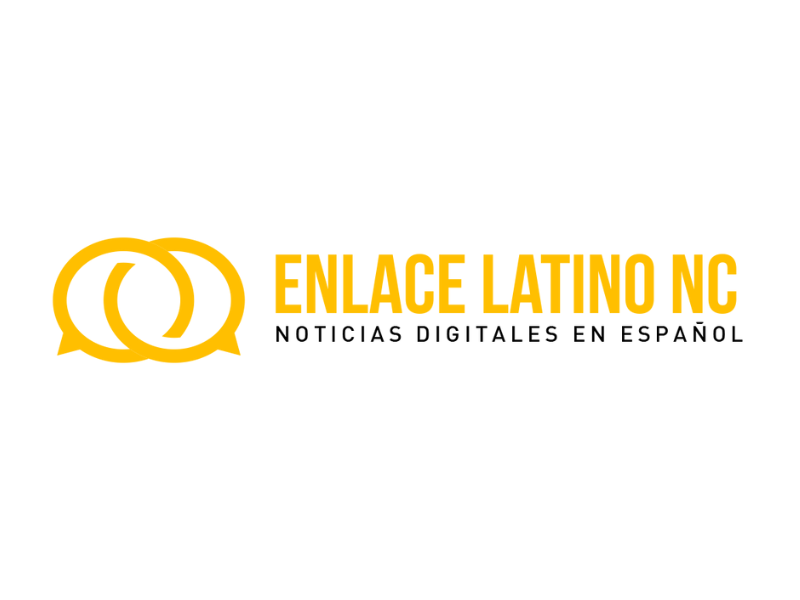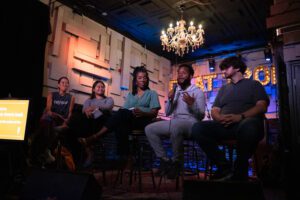Check out the full NC Local newsletter from October 5 for more from the Workshop, including industry news, job postings and shout-outs to journalists statewide. Sign up to get NC Local in your inbox every Wednesday.
By Gabriela Rivas-De Leon, NC Local News Workshop Intern
Happy Hispanic Heritage Month! Hispanics are one of the fastest-growing populations within the United States, and about 1 million North Carolina residents identify as Hispanic and/or Latinx. However, few news organizations around the state directly serve the Hispanic community with stories and resources.
Enlace Latino NC, founded in 2018, is the first Spanish digital-only media organization in North Carolina. Founded to close the information gap in the Latinx community, it boasts a website, a podcast, a radio show, and four newsletters that target the different rural and urban Spanish-speaking communities within the state.
During my discussion with Paola Jaramillo, the executive director and founder of Enlace Latino, she stressed the importance of collaboration with other news organizations around the state. Not only does collaboration boost awareness of Enlace, partnerships normalize accessibility for those who are non-white or multiracial.
Just because a resident of North Carolina doesn’t speak English does not mean they don’t have the right to access information that affects their day-to-day life. Advocacy is a shared responsibility, and I’m hopeful that through our community listening sessions and our focus on helping organizations like Enlace Latino find meaningful partners, everyone in North Carolina will be able to get trustworthy news and information, regardless of the language they speak.
My conversation with Jaramillo below is available in both Spanish and English, and has been lightly edited for length and clarity.
Gaby: ¿Cuál era el sueño o el objetivo de Enlace cuando empezó?
What was the dream or goal of Enlace when you started?
Paola: Nuestro objetivo principal cuanda comenzamos Enlace fue ayudar a llenar ese vacío informativo que hay entre las comunidades latinas, cuyo primer idioma es el español. Fue materia de información relacionada con la política local y estatal, la inmigración y los asuntos comunitarios, especialmente en esta era de desinformación y en su momento, cuando comenzamos, de temor que había entre nuestras comunidades en Carolina del Norte. ¿Fue una mezcla de muchas cosas, verdad?
Y luego esto se mezcló con lo que estaba pasando a nivel federal, que fue cuando llegó la elección del presidente Trump y vimos que Carolina del Norte se alinean directamente con las políticas federales. Entonces nosotros empezamos a ver que la gente empezaba a mandar mensajes de texto, de whatsapp, en las redes sociales. Por ejemplo, recibimos muchísimos mensajes alrededor de votar- cómo puedo votar si yo soy un residente americano? ¿Qué hago para votar, donde voy a votar?
Otras preguntaban alrededor de inmigración; Hubo una redada de inmigración, qué hago? ¿Cuáles son mis derechos? Este tipo de cosas nos dejó ver que había un vacío de información en esos temas. Entonces dijimos bueno, algo tenemos que hacer y tenemos que empezar a llenar ese vacío informativo que estamos viendo que la comunidad tiene.
Our main objective when we started Enlace was to help fill the information gap that exists among the Latino communities whose first language is Spanish. It was about information related to local and state politics, immigration and community issues, especially in this era of misinformation and at the time, when we started, of fear that existed among our communities in North Carolina. It was a mixture of many things, right?
And then that got mixed in with what was going on at the federal level, which was when President Trump’s election came along and we saw North Carolina align directly with federal policies. Then we started to see that people started to send text messages, WhatsApp messages, on social networks. For example, we got a lot of messages around voting — how can I vote if I’m a U.S. resident? What do I do to vote, where do I go to vote?
Others asked about immigration; there was an immigration raid, what do I do? What are my rights? These kinds of things made us realize that there was an information gap on these issues. So we said, well, we have to do something, and we have to start filling that information gap that we are seeing that the community has.
G: ¿Cuáles son los mayores retos a los que se enfrenta la organización?
What are the biggest challenges the organization faces?
P: Creemos que uno de los grandes challenges que nosotros tenemos es que estamos aprendiendo todavía cuál es nuestro modelo de negocios que funciona para nosotros.
Mirando a enlace como una organización, nos ha tomado tiempo aprender que puede funcionar como modelo de negocios. Para nosotros eso implica gente, tiempo, dinero y mucho aprendizaje, porque no todo lo que funciona para otro medio de noticias sin fines de lucro en Carolina del Norte, como ponerte un ejemplo. Nosotros llegamos a audiencias muy distintas. Número dos es la sustentabilidad. Nosotros tenemos que trabajar el triple o cuatro veces más para poder tener becas o subsidios. Ni siquiera llegamos a eso. Todos tenemos una falta de acceso a recursos de largo plazo y recursos operativos que nos ayuden a sostenernos con montos considerables.
Otro gran desafío que tenemos es mantener una plantilla y hacer crecer nuestra audiencia. Cuando eres un medio digital, no puedes contar cuantos personas alcances. Necesitamos aprender cómo vas produciendo ese periodismo que va de la mano de tu misión y tu visión, pero que también sirve a tus comunidades.
Somos cinco de tiempo completo. Gracias por el programa report of America que nos ayuda a pagar el salario de uno de ellos y tenemos dos becas, una de Poynter, para ayudar a pagar el salario de otro de nuestros periodistas. Y todos tenemos títulos, pero todos tenemos muchos sombreros y muy poco tiempo para poder hacer todo. Todo lo que queremos hacer entonces. Ese es el otro challenge que tenemos los salarios, eh? Cómo podemos ser competitivos ofreciéndoles buenos salarios a los periodistas. Es más complicado tener gente bilingüe o tener gente bilingüe y bicultural.
We are still learning what our business model works for us. Looking at Enlace as an organization, it has taken us time to learn what can work as a business model. For us that involves people, time, money and a lot of learning, because not everything that works for another non-profit, like Carolina Public Press, for example, will work for us. We reach very different audiences. Number two is sustainability. We have to work three or four times as hard to get grants or subsidies. We don’t even get there. We have a lack of access to long-term resources and operating resources to help us sustain ourselves with substantial amounts.
Another big challenge we have is maintaining a staff and growing our audience. When you are a digital media, you can’t count how many people you reach. We need to learn how we produce journalism that goes hand in hand with our mission and vision, but also serves our communities.
There are five of us full time. Thanks to the Report for America program, they pay the salary of one of them and we have two grants, one from Poynter, to help pay the salary of another one of our journalists. And we all have titles, but we all have too many hats and too little time to be able to do everything. That’s the other challenge we have with salaries. How can we be competitive by offering good salaries to journalists? It’s much harder to find or hire bilingual people or to find bilingual and bicultural people.
G: ¿Cuál es su esperanza para el futuro de Enlace Latino NC?
What is your hope for the future of Enlace Latino NC?
P: Tengo toda la esperanza puesta en que vamos a seguir creciendo. Vamos a seguir aprendiendo y vamos a seguir llegando a más comunidades, sirviendo a más comunidades latinas. Me encantaría mucho llegar a más comunidades latina rurales, porque son totalmente desatendidos. Porque son desatendidos, puede ser mucha desinformación, a que caigan presas de robos. A que simplemente les cueste mucho más integrarse a su nueva vida aquí en los Estados Unidos.
Además, creo mucho en la colaboración. La colaboración es fundamental y me encantaría que más medios de comunicación en español nos uniéramos y trabajemos juntos, porque al final del día el único beneficiado es la comunidad. Pero también nuestra comunidad puede colaborar con medios de comunicación en inglés, porque eso nos permite ampliar la voz. No solamente para ampliar nuestros problemas, sino también de nuestros avances, de nuestros progresos, de nuestros aportes. Sin estarnos preocupando sobre y ahorita cómo sobrevivimos y enfoquemos en hacer periodismo en cambio. Si la gente no está informada, no vamos para ningún lado.
I have every hope that we are going to continue to grow. We’re going to keep learning and we’re going to keep reaching more communities, serving more Latino communities. I would really love to reach more rural Latino communities, because they are totally underserved. Because they are underserved, there can be a lot of misinformation, they can fall prey to scams, they can fall prey to theft. They can just have a harder time integrating into their new life here in the United States.
Also, I believe a lot in collaboration. Collaboration is fundamental, and I would love for more Spanish-language media to join and work together, because at the end of the day the only beneficiary is the community. But also our community can collaborate with English-language media, because that allows us to amplify our voice. Not only to amplify our problems, but also our advances, our progress, our contributions. Without worrying about how we are surviving, let’s focus on doing journalism instead. If people are not informed, we are not going anywhere.




